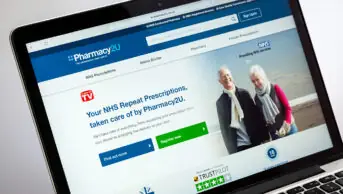
Shutterstock.com
Antibiotics are illegally available without a prescription through 45% of 20 online websites, a snapshot survey of the ‘online pharmacy’ industry has found, which could undermine efforts to tackle the threat of antimicrobial resistance through antibiotic stewardship.
Researchers at Imperial College London analysed the practices of 20 so-called ‘online pharmacies’ accessible to UK citizens.
To select pharmacies for the study, the researchers entered the search term ‘buy antibiotics online’ into Google and Yahoo and picked the ten pharmacy outlets topping the results of each search engine.
They then checked the online pharmacies’ websites thoroughly to see whether they were registered with the regulator, the Medicines and Healthcare products Regulatory Agency (MHRA), whether a prescription was required to obtain an antibiotic and whether the consumer could influence the type, dose and duration of antibiotic dispensed.
The researchers also checked whether the purchaser was required to provide information on allergies, comorbidities or pregnancy, and whether the online pharmacy provided any details of potential adverse effects prior to the sale.
By law, online medicine vendors selling to UK consumers must register with both the MHRA and the pharmacy regulator, the General Pharmaceutical Council in Great Britain (GPhC) (and the Pharmaceutical Society of Northern Ireland in that country).
However, the results of the study, published in the Journal of Antimicrobial Chemotherapy
[1]
, show that just five (25%) of the 20 online pharmacy websites studied displayed appropriate evidence of registration with both the MHRA and the GPhC and were the only ones to show evidence of operating from within Great Britain.
All five were online versions of UK high street pharmacies and required a prescription before an antibiotic would be delivered.
Overall, nine (45%) online pharmacies did not require a prescription prior to purchase, and six (30%) did not issue online prescriptions and instead required that a prescription be faxed or posted before an antibiotic would be delivered, although one did not specify the location from where they were operating so it was unclear whether an address would be provided.
A total of 16 of the 20 online pharmacy websites let customers have a choice over the type, dosage, and duration of antibiotic treatments. Only four of the online pharmacies, all based in Great Britain, used a prescriber-driven pathway.
The other GB-based pharmacy permitted a consumer-driven process prior to the point of payment, in which consumers were directed to an antibiotic choice depending on the syndrome they clicked on the web page. However, this website explained that a health questionnaire would need to be completed after payment to allow a doctor to assess an individual’s suitability for an antibiotic.
Only 30% of websites asked consumers to complete a health questionnaire prior to purchase, and only 70% provided information on the safe usage of prescription medications, including potential side effects or adverse reactions when combined with other drugs.
Sara Boyd, National Institute for Health Research academic clinical fellow in infectious diseases and microbiology at Imperial College and one of the researchers, says: “These findings are a real concern, and raise several important issues regarding antibiotic resistance and patient safety with online pharmacies.”

Source: Royal Pharmaceutical Society
Martin Astbury, Royal Pharmaceutical Society president, says: “Unnecessary antibiotic use can result in serious side effects in individuals and has a major impact on wider public health by increasing antibiotic resistance.”
Martin Astbury, president of the Royal Pharmaceutical Society, the professional leadership body for pharmacists, says: “Unnecessary antibiotic use can result in serious side effects in individuals and has a major impact on wider public health by increasing antibiotic resistance. We cannot support access to antibiotics through a web form until the standards for prescribing by private providers reflect the standard of face-to-face consultations in the NHS. Those involved in supplying medicines online should ensure their processes are as robust as possible.”
The researchers reported all the online pharmacies they identified as illegally selling antibiotics to patients within the UK to the MHRA.
An MHRA spokesperson issued a warning to the public that self-diagnosis and self-medication with antibiotics can be dangerous. “If you have a concern about your health, visit your GP, get a correct diagnosis and if medicines are prescribed, buy them from a legitimate source,” the spokesperson said.
“Medicines purchased outside the regulated supply chain or from illegitimate sources may be untested. That means there’s no way of knowing what’s in them or what they might do to your health – in the short term or long term. Chances are they simply will not work but they may contain potentially harmful ingredients. The consequences can be very serious.”
References
[1] Boyd SE, Prockter Moore LS, Gilchrist M et al. Obtaining antibiotics online from within the UK: a cross-sectional study. Journal of Antimicrobial Chemotherapy 2017. doi:10.1093/jac/dkx003


